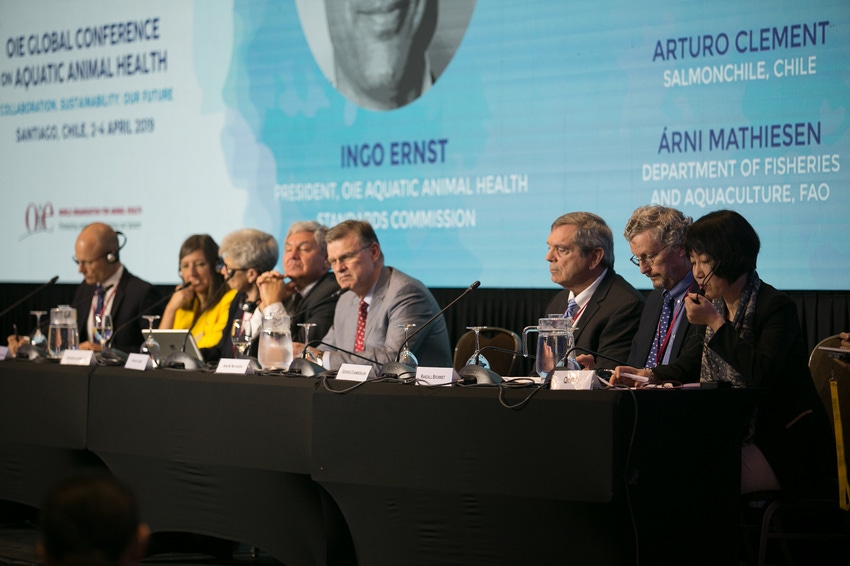Experts gather to discuss aquaculture health challenges and solutions at OIE Global Conference on Aquatic Animal Health in Chile.
April 2, 2019

Aquatic animal diseases are threatening the economic and environmental sustainability of aquaculture, the fastest-growing food production sector in the world and a source of income for almost 20 million people, according to an announcement from the World Organization for Animal Health (OIE), which is sponsoring a global conference on aquatic animal diseases this week in Santiago, Chile.
OIE said the focus of the conference will be on global performance in preventing disease — which costs more than $6 billion a year — monitoring outbreaks across borders and the need to implement international standards to help uphold aquatic animal health.
“With the aquaculture sector growing rapidly in demand and production, it will likely face greater disease risk and health challenges,” OIE director general Dr. Monique Eloit said. “By collaborating across borders and implementing OIE international standards, we can limit outbreaks of emerging diseases, which have already caused significant losses throughout the world, impacting national economies in some countries and threatening a vital source of nutritious animal protein.”
The conference, which is hosted and supported by the government of Chile, will highlight the critical need for coordinated global health programs to safeguard aquaculture productivity and sustainability.
Aquatic animals provide around 3.2 billion people with almost 20% of their average per capita intake of animal protein, OIE said, but recent projections suggest that production will have to double by 2030 to satisfy the growing demand for fish and seafood, with the majority of this growth coming from aquaculture.
Careful management of the health of aquatic animals has, consequently, become essential to supporting the development of sustainable aquaculture and to overcoming sanitary and biodiversity challenges emerging from high production and trade volumes as well as from the open environment in which these populations often live, OIE emphasized.
The conference theme — “Collaboration, Sustainability: Our Future” — includes a program of discussions around disease management, biosecurity and responsible use of antimicrobials -- the main challenges currently faced by the aquaculture sector.
The conference will also highlight recent updates on the OIE "Aquatic Code" and "Aquatic Manual" and will discuss OIE’s critical disease reporting tool: the World Animal Health Information System.
Other highlights include sessions on managing transboundary diseases and emerging diseases; biosecurity for aquaculture establishments; how to implement OIE international standards, and advances in disease management.
“Aquaculture is practiced by both some of the world’s poorest farmers and by multinational companies,” Eloit added. “Keeping aquatic animals healthy will help secure the livelihoods of millions around the world, protect the diversity of life below water and ensure food security for our future generations. Implementation of the OIE international standards is key for a sustainable aquaculture development through the improvement of the aquatic animal health worldwide.”
You May Also Like


.png?width=300&auto=webp&quality=80&disable=upscale)
